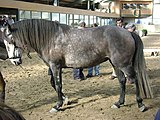70 Male, Lusitano Horses for Sale
showing results 41 - 50 of 70
price: $27,000
Perlino Lusitano stallion
5 yo perlino Lusitano stallion. Jogador is standing 16h. He is sired by Chateaubriant do Passargada and his dam is Caliente RF. He is IALHA registered. Jogador was started under saddle last spring ... SEE MORE DETAILS found on Equine NowSaint-Felix-De-Kingsey, QC, Canada
price: $4,000
Beautiful smokey black registered Lusitano filly
Nirvana is a very well bred and fine example of her breed. She has a cute disposition and cycles regularly. She is currently at pasture in Utah and is recovering from an injury to her left butt. Sh... SEE MORE DETAILS found on HorseclicksSan Diego, CA, United States
price: $9,500
Picasso
Picasso. Lusitano Colt Prince do dpc x Torsidilla va SEE MORE DETAILS found on Equine NowLos Banos, CA, United States
price: $4,000
Smokey black registered Lusitano filly $4000 **see my comments below**
Nirvana is a stunning, registered, smokey black Lusitano filly. She is smart and curious with a good mind. Because she is smokey black and her sire is cremello she should be able to add color to an... SEE MORE DETAILS found on HorseclicksSan Diego, CA, United States
price: $10,000
Yearling Lusitano gelding
Flashy chestnut Lusitano gelding. DOB 5/5/18 - registered IALHA with parentage verified and coat color analysis; micro chipped. Well handled since birth - excellent ground manners - leads, ties, ba... SEE MORE DETAILS found on HorseclicksClovis, CA, United States
price: $30,000
Lusitano Bay APSL Approved Stallion When You Want The Best
Eldorado do Royal Larapio MAC x Ursa Mayor VO APSL approved IALHA reg. Futurity winner Dressge Champion proven sire. EeAa no gray gg .Will pass color including possible black depending on the genet... SEE MORE DETAILS found on Equine NowSaint Charles, IL, United States
price: N/A
Bay Lusitano IALHA REG x National Champion
Breeding for upper level DRESSAGE or Working Equitation AI . Collection and shipping fees are the responsibilty of the mare owner and payable directly to the vet service. Spectacular movement and b... SEE MORE DETAILS found on AdvertigoLos Angeles, CA, United States
price: $120,000
imported Prix St George Competition Gelding
Brilliant Mover! 2010 Imported Prix St George Competition Gelding Located in Ocala Florida 16.2H Imported Lusitano trained and competed at PSG Prix St George Recently imported from Brazil Florette ... SEE MORE DETAILS found on Equine NowOcala, FL, United States
price: N/A
H Lusitano grey gelding
Grey H Lusitano Schoolmaster for lease or sale Imported from Brazil 3rd level piaffe passage Needs min 3rd level or advanced rider Excellent footing Lessons and training with owner certified traine... SEE MORE DETAILS found on AdvertigoAustin, TX, United States
price: N/A
Imported Lusitano
Giamante do Arete (by Zambaionne Comando) is a h Lusitano gelding imported from Brazil in . Geo as he is known around the barn has d a little bit of everything he is safe sane and sound He has been... SEE MORE DETAILS found on AdvertigoSan Francisco, CA, United States
Sale by Discipline
Sale by Sex
- 26Female
Sale by Age
Sale by Color
More information on Lusitano


The Lusitano is a Portuguese horse breed, closely related to the Spanish Andalusian horse. Both are sometimes called Iberian horses, as the breeds both developed on the Iberian peninsula, and until the 1960s they were considered one breed, under the Andalusian name. Horses were known to be present on the Iberian Peninsula as far back as 20,000 BC, and by 800 BC the region was renowned for its war horses. When the Muslims invaded Iberia in 711 AD, they brought Barb horses with them that were crossed with the native horses, developing a horse that became useful for war, dressage and bull fighting. In 1966, the Portuguese and Spanish stud books split, and the Portuguese strain of the Iberian horse was named the Lusitano, after the word Lusitania, the ancient Roman name for Portugal. There are three main breed lineages within the breed today, and characteristics differ slightly between each line. There is also the Alter Real strain of Lusitano, bred only at the Alter Real State Stud.
Lusitanos can be any solid color, although they are generally gray, bay or chestnut. Horses of the Alter Real strain are always bay. Members of the breed are of Baroque type, with convex facial profiles, heavy muscling, intelligent and willing natures, with agile and elevated movement. Originally bred for war, dressage and bullfighting, Lusitanos are still used today in the latter two. They have competed in several Olympics and World Equestrian Games as part of the Portuguese and Spanish dressage teams. They have also made a showing in driving competitions, with a Belgian team of Lusitanos winning multiple international titles. Members of the breed are still used in bloodless bullfighting today, where it is expected that neither horse or bull will be injured.
read more on WikipediaLusitano Prices
Lusitano Listings Count